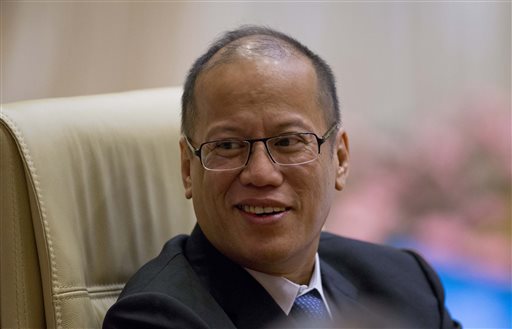
LAPU LAPU CITY, Philippines—“Stable, able and resilient.”
This was how President Aquino described the Philippines before the finance ministers of the Asia-Pacific region, stressing how his administration in less than six years managed to turn around the country’s economy through strong macroeconomic fundamentals and good governance.
In his speech at the Asia-Pacific Economic Cooperation (Apec) finance ministers’ welcome event, Aquino said the past five years had seen the Philippines “climb multiple global measures of competitiveness.”
This includes being rated 52nd in the World Economic Forum’s Global Competitiveness Index from being 85th, going up to 95th from 144th in the World Bank’s Ease of Doing Business Report, he said.
“Naturally, the global community has taken notice that in empirical terms—and in terms of self-confidence—the Philippines is stable, able and
resilient,” Aquino said.
The President said he shared the “Philippine story” to “illustrate that, regardless of the seeming magnitude of the challenge, progress can be achieved sooner rather than later—especially if we work with solidarity, coherence and integrity.”
“Of course, achieving this on a regional level will entail a greater amount of work, cooperation and time. But my optimism is shaped by my experience of how a group with a unified sense of purpose can accelerate our shared journey toward prosperity,” he said.
Cebu Action Plan
The President welcomed the Apec’s adoption of the Cebu Action Plan, designed to integrate the region’s financial sector while enhancing resiliency, fiscal transparency and infrastructure development.
“I am told that it ticks all the right boxes: Better financial integration among Apec members fosters an environment ripe for investment; greater transparency as regards government funds maximizes efficiencies; and, more importantly, the benefits enjoyed by our peoples; and a renewed commitment to improve and finance infrastructure that will lay the necessary foundations for continued growth,” the President said.
He also took note of how the Cebu Action Plan would “equip” the member-states’ ability to respond to “some of the gravest threats to our economies in the form of natural disasters, particularly those caused by the new normal of climate change.”
The international community has recognized the fiscal transparency of the Aquino administration, Budget Secretary Florencio Abad later told reporters.
No. 1 in open budget
According to Abad, the International Budget Partnership, which rates governments’ budget transparency, and its collaborating agencies have ranked the Philippines No. 1 in Southeast Asia in terms of open budget.
In its 2015 report, the group ranked the Philippines 64 points out of a total of 100, the country’s “highest since the open budget index was started in 2006,” Abad said, noting that the Philippines was previously ranked 48 points.
“We are next to South Korea in the whole of Asia and the 21st in the world. So, I think this is recognition that the Philippines plays a leading role insofar as promoting greater transparency,” Abad said.
He also emphasized that ratings of third-party institutions like the International Budget Partnership that set the benchmarks lent “credibility” to the Philippines’ standing in terms of good governance.
“I think that recognition gains a lot of traction with the investing public, credit rating institutions and you know especially with the people in the country… [this] promotes greater trust and confidence,” Abad said.
In his speech, the President said his administration ensured that the economic growth should be inclusive, the paramount gauge for “real growth.”
He said this was best exemplified by the successful implementation of the conditional cash transfer (CCT), the government’s poverty alleviation program.
The President said the CCT’s coverage had expanded to 4.4 million households from less than 800,000. The figure, according to the President, covers about 20 million of the country’s population.
As he was wont to do, Aquino invoked the sins of his predecessor, former President and now Pampanga Rep. Gloria Macapagal-Arroyo, for the “tremendous challenges” that his administration faced when it took over more than five years ago.
He said his administration went after those who “committed wrongdoing” aside from revamping the government’s budgeting system, exercising fiscal prudence where taxpayer money “is spent prudently, conscientiously and judiciously on projects and programs that truly benefit our people. We cut red tape and made it easier for investors to bet on the Filipino people.”
Integrate financial markets
Also on Thursday, the national treasurer told a meeting of finance ministry officials from Apec that Asia-Pacific nations must integrate their financial markets more closely to boost trade and investment.
“It is imperative for Apec to further advance financial integration as a driver for intensified intraregional trade and investment,” Roberto Tan said, even as China’s slowdown clouds economic prospects.
Tan was speaking here at the start of a meeting of finance ministers from the 21-member bloc.
He also called for fiscal reforms to make policy more effective, and stressed the importance of public-private partnerships in financing the region’s infrastructure needs, estimated by the Asian Development Bank at $800 billion a year.
“For this to materialize, bankable projects have to be identified in the pipeline and capital markets developed,” he said.
The Cebu meeting takes place amid growing concern over slower growth in China, the world’s second-largest economy, and recent ructions in global financial markets following Beijing’s devaluation of its currency last month.—With wire report

